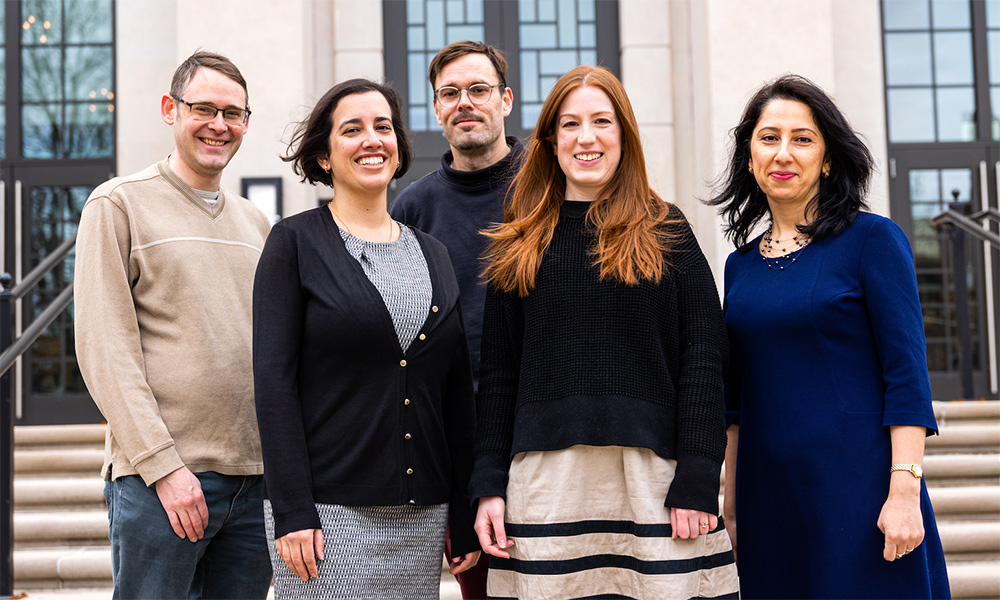Denison University’s Board of Trustees has recently awarded tenure to six members of the faculty. Those who have been granted tenure and will be promoted to associate professor in the fall of 2022 are Dan Blim, Zarrina Juraqulova, Nausica Marcos Miguel, Shiri Noy, Keith Allyn Spencer, and Kristina Steiner.
“Denison faculty are among the best in the liberal arts,” says Denison University Provost Kim Coplin. “In addition to their outstanding scholarship, these professors are committed to engaging in pedagogies that deepen student learning. They also provide advising, mentorship, and opportunities for our students to do original research and creative work. We are thrilled to welcome these new members to the ranks of our tenured professors.”
Music professor Blim arrived at Denison in 2015. In both his teaching and research, he reveals how studying music is a way to learn about people’s values, attitudes, and identities. In the classroom, he helps students listen more deeply to music, think critically and analytically about history, and reflect on their own musical lives. His research delves into various aspects of American music. He investigates the navigation of musical theater through shifting cultural politics in the U.S., as well as how music shapes public perceptions of presidential candidates. Blim also explores how musical quotation of Native American music in turn-of-the-20th-century piano music reflects how attitudes toward Native Americans changed in that era, and how critics and political pundits discussed the country music score in the 1975 film Nashville as a proxy for larger debates over country music and politics in the 1970s. He is working on an ongoing book project on the role of sound in public memory, seen through concert works about 9/11 and the use of sound design in museums and memorials.
Economics professor Zarrina Juraqulova joined Denison ins 2015. Before pursuing a doctoral degree in economics, she worked as a program specialist and consultant in various international organizations such as Red Crescent Society, United Nations Development Program, Winrock International, and World Bank in Tajikistan. Juraqulova teaches a wide range of economic courses. As an applied economist, her research primarily focuses on economic analysis of the academic labor market in the US, gender relations, intrahousehold bargaining power, and reproductive health care services in Central Asia.
Modern language professor Marcos Miguel joined Denison in 2015. Her research interests focus on facilitating language learning by examining instructional practices and learning processes relative to learning derivational morphology and vocabulary in the second language classroom. “For me, integrating research with teaching practices is fundamental. For example, given our current knowledge about the significance of vocabulary depth, I work on different areas of lexical knowledge in my classroom. Reciprocally, these teaching experiences inform my research. Knowing how decisive teaching materials are for instruction, I am further exploring their role and influence. In my latest projects, I have been focusing on how to integrate corpora such as Corpus del Español in the language classroom.”
Anthropology/sociology professor Shiri Noy joined Denison in 2018. Her research spans the areas of political, development, and cultural sociology focused on topics ranging from public perspectives on science and religion to health policy in Latin America. “I am fundamentally interested in how we approach ways of understanding the social world, and how best to collect and analyze data that helps us untangle and address issues of substantive, conceptual, theoretical, and empirical interest.”
Studio art professor Keith Allyn Spencer joined Denison in 2016. His work explores new relationships to material and his environment, undermining any obvious technical abilities, processes, or rationale. Painting is the catalyst of his broader art practice of activating and intervening in public space. “I seek inspiration from a range of sources: home life, domestic objects, forms in nature, and engagement with culture. I search for ways to destabilize painting — preferring to consider painting as sculpture, as entertainment, as therapy, protest, prank, decoration, and even painting as non-painting.”
Psychology professor Kristina Steiner joined Denison in 2016. She is a lifespan developmental psychologist whose research program focuses on autobiographical memory. “People from all different age groups write or orally share their life stories or specific memories with me, and I use that information to look at their well-being, self-esteem, and to predict how they’ll behave or for what purpose they use their memories. I work with students on research projects that investigate these types of questions.”
